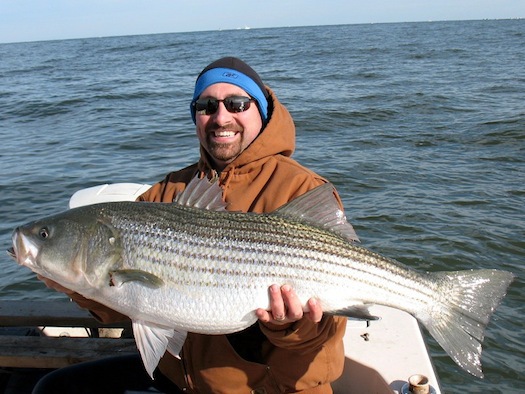
Chesapeake Bay striped bass. Photo: George Halt, courtesy Wikimedia Commons.
When Brandon White and his brother Spencer founded a company called Lateral Line in 2005, they had two goals: to provide anglers with durable, high-performance fishing apparel and to create a social enterprise that reflects care about its community and the environment and, most important, the conservation of fisheries. It was a logical way to run a business, Brandon White says about the Easton, Maryland–based company, noting, “If you don’t give back to fisheries’ conservation, there won’t be anything more to fish.”
What White didn’t realize at the time was that his concept for a small business also positioned Lateral Line for certification as a Benefit Corporation, or B Corp, a new type of corporate designation that recognizes enterprises that meet strict triple-bottom-line standards and provides consumers and investors with a verifiable seal of approval. After hearing about B Corps, White applied and won certification as well as legal status for Lateral Line in Maryland, which is one of four states (Vermont, Virginia and New Jersey are the others) to recognize this new corporate form. For White, becoming a B Corp made sense because it validates Lateral Line’s core principles. “There’s a lot of noise in the marketplace with companies saying we are green and eco-friendly and doing the triple bottom line,” White explains, “but there has to be a way to separate those who are doing it and those who are using it as a marketing message. This certification separates us.”
Unlike other corporate entities such as an LLC or a C-Corp, which oblige the company to maximize profits for owners and shareholders, a B Corp is legally bound to maintain social principles that benefit employees, the environment and the community. While some investors might cheer a company that slashes pensions and health benefits, or outsources to cheap factories to cut labor costs, a B Corp and its management can be held legally accountable if the company does not meet social awareness and responsibility standards. “It allows a company to create social value and not just personal wealth and shareholder value,” says Jay Coen Gilbert, a co-founder of B-Lab, the nonprofit organization created in 2006 that is the driving force behind the B Corp movement.
To win certification, B Corp applicants subject their policies and operations to examination and they are audited by a third party to ensure the maintenance of standards. So far, more than 400 companies have received B Corp certification from B Lab. (Because of the limited number of states currently enacting this legislation, only a dozen businesses, including Lateral Line, have official Benefit Corporation legal status as of this writing). The 400 range from sole proprietors and small businesses that one might expect to be social enterprises — makers of organic dog biscuits, craft brewers and a goat’s milk ice cream outfit — to natural-consumer-products companies like Method and Seventh Generation, as well as commercial banks and manufacturers, architecture and design firms and financial-advisory services. B Corps fill a gap because, for the most part, “Corporations are not concerned with the public good, and nonprofit models constrain an entrepreneur who wants to build quickly and scale up and seek outside investors,” says Coen Gilbert, who started B-Lab with two colleagues who were involved in a successful sports apparel business that, he has said, had social responsibility aspirations without the supporting legal structures.
Lateral Line’s Benefit Corporation credentials include donating 2 percent of gross sales to the conservation of fisheries, tapping local sources and vendors, and seeking eco-friendly material for its fishing apparel, among other qualifications. A small business and a small step forward, to be sure. But Coen Gilbert sees companies like Lateral Line as part of a broader movement, one that is likely to grow as more states pass B Corp legislation, companies seek certification and consumers become aware of what the certification stands for. “We are witnessing the emergence of a new sector of the economy,” he says about social enterprises and B Corps. “If we can use business for the social good that would be a powerful tool for social change.”

